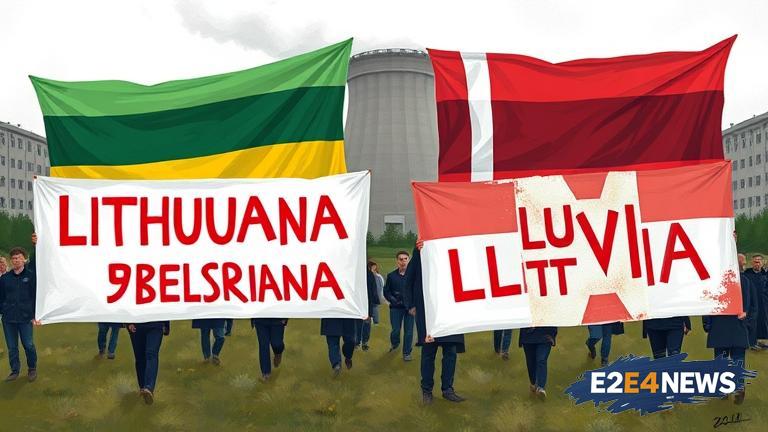The governments of Lithuania and Latvia have come together to voice their opposition to the Belarusian nuclear power plant, located in Ostrovets, Belarus. The plant, which is expected to be operational by the end of 2023, has raised concerns among neighboring countries due to its proximity to the border and potential environmental and health risks. Lithuania and Latvia have expressed their concerns over the safety of the plant, citing the lack of transparency and cooperation from the Belarusian government. The two countries have called for increased safety measures and international monitoring to ensure the plant is operated safely. The Belarusian nuclear power plant has been a topic of controversy for several years, with neighboring countries expressing concerns over the potential risks of nuclear accidents and radioactive waste disposal. Lithuania and Latvia have been at the forefront of opposition to the plant, citing the potential risks to their environment, health, and economy. The two countries have also expressed concerns over the potential impact on the region’s water resources, including the Nemunas River, which flows through Lithuania and into the Baltic Sea. The Belarusian government has maintained that the plant is safe and meets international safety standards, but neighboring countries remain skeptical. The European Union has also expressed concerns over the plant, calling for increased transparency and cooperation from the Belarusian government. The EU has offered to provide technical assistance and support to help ensure the safe operation of the plant. Despite these efforts, the controversy surrounding the Belarusian nuclear power plant continues to escalate, with neighboring countries calling for increased action to address their concerns. The situation has also sparked a wider debate over the use of nuclear energy in the region, with some countries advocating for a shift towards renewable energy sources. Lithuania and Latvia have pledged to continue working together to address their concerns over the Belarusian nuclear power plant, and to push for increased safety measures and international monitoring. The two countries have also called for greater transparency and cooperation from the Belarusian government, and for the EU to take a more active role in addressing the concerns of neighboring countries. The controversy surrounding the Belarusian nuclear power plant is likely to continue, with neighboring countries remaining vigilant and pushing for increased action to address their concerns. The situation highlights the need for greater cooperation and transparency in the region, and the importance of prioritizing safety and environmental protection. The Belarusian nuclear power plant is a significant concern for the region, and it is essential that all countries work together to ensure its safe operation. The plant’s location, near the border with Lithuania and Latvia, makes it a pressing concern for these countries, and they will continue to push for increased safety measures and international monitoring. The EU’s role in addressing the concerns of neighboring countries will be crucial, and it is essential that the organization takes a more active role in promoting transparency and cooperation in the region. The controversy surrounding the Belarusian nuclear power plant is a complex issue, with many different factors at play. However, one thing is clear: the safety and environmental concerns of neighboring countries must be taken seriously, and all countries must work together to ensure the safe operation of the plant. The situation is a reminder of the importance of prioritizing safety and environmental protection, and of the need for greater cooperation and transparency in the region. The Belarusian nuclear power plant is a significant concern, and it is essential that all countries work together to address the concerns of neighboring countries and ensure the safe operation of the plant.
